Source: Amnesty International
The Iranian holiday Nowruz نوروز (“new day”) is an ancient holiday celebrated on the first day of
spring in the northern hemisphere to welcome in the new year. On this Nowruz we want to
remember several courageous prisoners of conscience and political prisoners in Iran with Nowruz
greetings. We ask you to send cards with simple Nowruz greetings such as “Nowruz mobarak”
مبارک نوروز You can say “thinking of you at Nowruz time” or “hoping you are well.” You may
send a greeting in either English or Farsi (Persian) but please do not mention Amnesty
International or specifics of the recipient’s case. Please also refrain from mentioning the political
situation, human rights or U.S.-Iran relations. We suggest sending cards with pictures of
landscapes, spring flowers or the like, in keeping with the spirit of the holiday and the message of
hope and renewal. Please do not choose cards that have pictures of people, and please do not use
cards that depict bottles of wine or other alcoholic beverages.
Traditional Nowruz celebrations include the preparation of a Haft Sin table which literally means
the seven s’s. Seven items beginning with the Persian letter Sin (equivalent to the English s) and
which represent spring time are set out. To honor this tradition, this year Amnesty International
has selected seven cases, prisoners of conscience and political prisoners, who have been
identified by Amnesty International as “individuals at risk” and are therefore targeted for
intensified campaigning. Several of them have been sentenced to long prison terms for their
peaceful activism and several are in poor health.
This year we are requesting that people take pictures of their Nowruz cards, or of themselves
holding up their Nowruz cards before putting them in the mail and sending the pictures to us
([email protected] or [email protected]). Please post them on your Facebook pages as well as
on your Twitter accounts, tagging Amnesty International’s Iran account (@AmnestyIran) so that
we can retweet you.
Our previous Nowruz actions have been very successful! Three subjects of the 2016 Nowruz
action—Omid Kokabee, Bahareh Hedayat and Atena Farghadani, were released thanks to the
persevering efforts of many committed activists. Student leader Majid Tavakkoli, who had been
featured in several previous Nowruz actions, was released from prison in 2015. Other subjects of
previous Nowruz actions who have been released from prison include Mansour Ossanlu,
Hengameh Shahidi, Emadeddin Baghi, Nasrin Sotoudeh and brothers Kamiar and Arash Alaei.
Kamiar and Arash related how they were given a brief medical furlough from prison and went
back to the their parents’ house to find hundreds of Nowruz cards sent to them by Amnesty
activists and how much that cheered them up and gave them the strength to go on. Omid Kokabee
also received hundreds of Nowruz greetings and he and his family thanked Amnesty members
profusely. This action really matters! Please see next pages.
Seven Leaders of Iran’s Baha’i Community
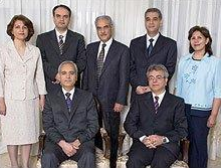
Seven leaders of Iran’s Baha’i community were sentenced to twenty years in prison by a
Revolutionary Court in Tehran on 7 August 2010. Although they have done nothing more than
peacefully practice their religion, they were convicted on serious, but baseless, charges including
“espionage for Israel,” “insulting religious sanctities” and “spreading propaganda against the
system.” They had also been charged with “ifsad fil arz” or “corruption on earth.” All seven had
been held in Section 209 of Evin Prison in Tehran, which is run by the Ministry of Intelligence,
but were later moved to Raja’i Shahr (Gohardasht) Prison in Karaj where conditions are
particularly poor. The two females among the seven are now back in Evin Prison in Tehran.
The seven include two women, Fariba Kamalabadi and Mahvash Sabet, and five men:
Jamaloddin Khanjani, Afif Naeimi, Saeid Rezaei, Behrouz Tavakkoli and Vahid Tizfahm. All are
leading members of a group responsible for the Baha’i community’s religious and administrative
affairs. Mahvash Sabet who acted as the group’s secretary, was arrested on 5 March 2008. The
others were arrested on 14 May 2008. From their arrest until August 2010, the seven were held in
Section 209 of Evin Prison and were allowed very limited access to their lawyers while they have
been in custody. The leaders are now serving only 10 years of their 20-year prison sentences as a
new provision in the 2013 Islamic Penal Code allows anyone convicted of multiple charges to
serve only the longest sentence for any single charge.
The Baha’i community in Iran (estimated to be about 300,000) has been subjected to increasingly
harsh persecution in recent years and over 100 Baha’is are currently in detention in Iran, while
many others have been released on bail and are awaiting trial or have charges pending against
them. The Baha’i faith is not recognized as a religion in Iran’s Constitution, and Baha’is are
excluded from institutions of higher education in Iran. Educators and staff with the Baha’i
Institute for Higher Education, established to provide an alternative education to Baha’i young
people, have been arrested and imprisoned simply for their peaceful educational activities.
The former U.N. Special Rapporteur on the Situation of Human Rights in Iran, Ahmed Shaheed,
had condemned the persecution of the Baha’i community by the Iranian authorities, including in
his report issued in March 2016.
You can send Nowruz greetings to the seven Baha’is to:
Baha’i International Community
15 route des Morillons
1218 Grand Saconnex
Switzerland
Narges Mohammadi
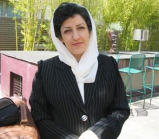
Narges Mohammadi is a distinguished and passionate defender of human rights. She was vicepresident
of the Center for Human Rights Defenders (CHRD) which reported on violations of
human rights in Iran provided pro-bono legal representation to political prisoners and support to
their families before it was forcibly closed by the Iranian authorities in December 2008. The
Center was co-founded with prominent human rights attorneys, including Iran’s Nobel Peace
Prize laureate Shirin Ebadi. Narges Mohammadi also founded the organization Step by Step to
Stop Death Penalty, a group campaigning against the death penalty in Iran.
Narges Mohammadi has paid more than most for her human rights activism. She has suffered
years of harassment and intimidation from the Iranian authorities and has been in and out of
prison for over a decade. She is currently serving a total of 22 years in prison. She was convicted
of several unsubstantiated national security charges including “membership of an illegal
organization whose aim is to harm national security” for founding Step by Step to Stop Death
Penalty; “spreading propaganda against the system;” and “assembly and collusion against
national security.” The “evidence” used against her included her media interviews; participating
in gatherings outside prisons before executions to support the families of death row prisoners; her
connections with other human rights defenders, such as Nobel Peace Prize Laureate Shirin Ebadi;
and her meeting with Catherine Ashton, the former European Union’s High Representative for
Foreign Affairs and Security Policy on International Women’s Day and other women human
rights defenders on 8 March 2014.
Narges Mohammadi has not been able to communicate regularly with her ten-year-old twins—a
girl, Kiana and a boy, Ali; after her arrest they joined their father Taghi Rahmani in Paris, where
he lives as a refugee. She suffers from a number of serious health problems which have been
exacerbated because of her treatment by authorities, and for which she has not been allowed
adequate treatment. She has undergone hunger strikes to protest her treatment.
She is a prisoner of conscience, imprisoned solely for her peaceful exercise of her rights to
freedom of expression, association, and peaceful assembly. In October 2016 several members of
Iran’s parliament sent a letter to the Head of the Judiciary Sadegh Larijani, calling for her release.
You can send Nowruz greetings for Narges Mohammadi to her husband and children:
Mr Taghi Rahmani
c/o Iran Team, Middle East and North Africa Programme
Amnesty International/ International Secretariat
1 Easton Street
London WC1X 0DW
United Kingdom
Abdolfattah Soltani

Abdolfattah Soltani, a prominent human rights lawyer, and together with Iran’s Nobel Peace
Prize laureate Shirin Ebadi, a founder of the Center for Human Rights Defenders (CHRD), is
serving a 13-year prison sentence in Evin Prison. The Iranian government forcibly shut down the
CHRD in December 2008.
Abdolfattah Soltani was arrested on 10 September, 2011. He had been previously detained on
other occasions for his devoted service to his clients, including well-known prisoners of
conscience, as well as his tenacious advocacy on behalf of human rights in Iran. On at least two
occasions since his detention, he has said he had been pressured to make a televised “confession,”
including that the CHRD had received funding from foreign sources to encourage a “soft
revolution” in Iran, which Abdolfattah Soltani denies. In early March 2012 he was informed that
he had been sentenced to 18 years in prison for “spreading propaganda against the system,”
“forming an illegal opposition group [the CHRD]” and “gathering and colluding with intent to
harm national security.” His sentence was eventually reduced to 13 years. He suffers from a
number of severe health problems, for which he has not received adequate treatment.
He had been the lawyer for the seven leaders of Iran’s persecuted Baha’i community who are
currently in prison, as well as for a number of individuals who had been charged in connection
with their peaceful involvement with the Baha’i Institute of Higher Education, founded to
provided educational opportunities for Baha’i students who are systematically excluded from
Iran’s universities; several of them were sentenced to prison after Abdolfattah Soltani’s arrest.
In October 2012 the International Bar Association awarded its Human Rights Award to
Abdolfattah Soltani. On 6 February 2013 the United Nations Working Group on Arbitrary
Detention concluded that the detention of Abdolfattah Soltani is arbitrary, and called on the
Iranian government to release him immediately.
Abdolfattah Soltani’s wife Massoumeh Dehgan has also been targeted: Branch 15 of the Islamic
Revolution Court sentenced her to one year of imprisonment, suspended for five years, and
banned her from travelling abroad for five years, on charges of “propaganda against the system.”
You can send Nowruz greetings to Abdolfattah Soltani at:
c/o Iran Team, Middle East and North Africa Programme
Amnesty International/ International Secretariat
1 Easton Street
London WC1X 0DW
United Kingdom
Zeynab Jalalian
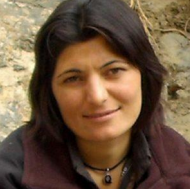
Iranian Kurdish activist Zeynab Jalalian, aged 34, who is serving a life sentence imposed after a
grossly unfair trial, is at risk of losing her eyesight in prison. The authorities have continued to
deny her the specialized medical treatment she needs for a worsening eye condition which her
family believes was caused by injuries she suffered under torture in detention.
Zeynab Jalalian was working to empower Iran’s ethnic minority Kurds, particularly women when
she was arrested in 2008. She was sentenced to death in early 2009 by Branch One of the
Revolutionary Court in Kermanshah Province. After a trial lasting only a few minutes she was
convicted of “enmity against God” (moharebeh)– a charge levelled against those accused of
taking up arms against the state – in connection with her supposed links to the armed wing of a
Kurdish opposition group. Her conviction and sentence were based on “confessions” she said
were extracted after months of torture. She was also denied access to a lawyer. The death
sentence was commuted to life in prison in late 2011.
Before her trial, she was held in solitary confinement for eight months. During this time she was
flogged on the soles of her feet and her head was repeatedly rammed against a wall, fracturing her
skull and causing bleeding in her brain. She suffers from a severe eye condition and urgently
needs specialist surgery. However the authorities won’t permit it and have also refused her
repeated requests for medical leave. Some of her requests have been rejected outright while
others have been accepted on condition that she makes videotaped “confessions.” On one
occasion, she says prison authorities told her that she had to have a virginity test before they
would allow her to receive medical treatment. Withholding medical treatment resulting in severe
pain or suffering in order to force a “confession” amounts to torture under international law.
In April 2016 the UN Working Group on Arbitrary Detention urged the Iranian authorities to
release Zeynab Jalalian immediately and accord her an enforceable right to compensation
Nowruz greetings to Zeynab Jalalian can be sent:
c/o Darioush Bakhshi
Head of Khoy Prison
Khoy Prison
Salmas Road (across Rah va Tarabari)
Khoy County
West Azerbaijan Province
Iran
Arash Sadeghi and Golrokh Iraee
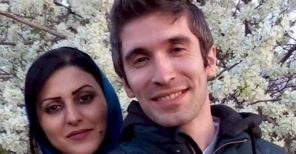
Golrokh Ebrahimi Iraee and her husband Arash Sadeghi are both prisoners of conscience. They
were arrested together in September 2014 and were convicted and sentenced after an unfair trial
that consisted only of two brief sessions in 2015. They had no legal representation at the trial.
Golrokh Iraee was sentenced to six years in prison on charges including “insulting Islamic
sanctities” for writing a fictional story about the horrific practice of execution by stoning. This
story had not been published but was found when authorities searched her personal computer. She
started serving her sentence in October 2016; she was released temporarily, but was re-arrested
and sent back to prison on 22 January 2017.
Arash Sadeghi has been serving a 15-year sentence in Evin prison for his peaceful human rights
activities since June 2016. The charges against him included “gathering and colluding against
national security,” “spreading propaganda against the system,” and “insulting the founder of the
Islamic Republic.” He conducted a 71-day hunger strike from October 2016 to January 2017 to
protest the imprisonment of his wife. During that time he suffered from multiple health problems
but he was not provided with needed medical attention. He continues to suffer from kidney
damage, inflamed and severely infected lungs, severe drops in blood pressure, irregular heartbeat,
shortness of breath, nausea and vomiting blood, for which he has not been given proper care.
Arash Sadeghi had been studying philosophy at Allameh Tabatabai University until he was
banned from continuing his education because of his political activism; he had been arrested a
number of times for participating in demonstrations protesting the outcome of the 2009
presidential election. He has been subjected to severe torture during his detentions. He was hung
from the ceiling by one leg and was beaten so savagely that his shoulder was dislocated and his
teeth were broken. During another beating, his eardrum was torn. During yet another beating, he
was blindfolded and kicked and punched in the face, causing bleeding and damage to his eyes and
consequent vision problems. To compound his misery, when security forces sought his arrest in
November 2010, they broke a window and entered in his home looking for him. He was not there
at the time, but his mother suffered a heart attack during the break-in and died shortly later.
Nowruz greetings to Golrokh and Arash can be sent:
Iran Team, Middle East and North Africa Programme
Amnesty International/ International Secretariat
1 Easton Street
London WC1X 0DW
United Kingdom
Mohammad Sadiq Kabudvand
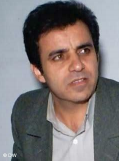
Mohammad Sadiq Kabudvand, an Iranian Kurdish journalist and founder and chair of the Human
Rights Organization of Kurdistan (HROK), has been serving a ten-year sentence in Evin prison
since 2007. In May 2008 following an unfair trial in Branch 15 of the Revolutionary Court in
Tehran, he was sentenced to prison for his peaceful human rights advocacy. He has been
suffering from poor health—including heart and kidney problems—but he has not received
adequate medical attention. He has undertaken hunger strikes to protest his treatment.
Until 2004, Mohammad Sadiq Kabudvand was the editor of a weekly newspaper, Payam-e
Mardom-e Kordestan, which carried articles promoting the cultural and political rights of Iran’s
Kurdish minority. The publication was issued a three-year ban by Iran’s judiciary on June 27,
2004 for “disseminating separatist ideas and publishing false reports.” Mohammad Sadiq
Kabudvand has also published three books and was awarded the Hellman/Hammett Grant from
Human Rights Watch in January 2009. The grants are awarded to “writers punished by their
governments for expressing opposition views, criticizing government officials or actions, or
writing about topics that the government does not want reported.”
His wife said that though her husband made regular requests for prison leave – to which he is
entitled under Iranian law – each request is either summarily rejected by the Prosecutor’s office
or ignored. In April 2014 Mohammad Sadiq Kabudvand was one of more than two dozen
prisoners reported to have been injured by prison authorities who entered Section 350 of Evin
Prison to conduct a search. When his wife visited him a few days later he was severely bruised,
had two broken toes, three broken ribs, internal bleeding, and his head had been shaved.
In 2016 authorities charged him with “spreading propaganda against the system” from inside
prison, perhaps because he had written a letter advocating for peace between Kurdish groups and
the Turkish government and had issued a statement expressing concern about atrocities carried
out by the Islamic State against Kurdish people in Syria. In May 2016, he was put on trial before
a Revolutionary Court in Tehran in relation to these accusations. The session apparently lasted no
longer than 30 minutes and he was not represented by a lawyer.
You can send Nowruz greetings for Mohammad Sadiq Kabudvand to his family at:
Zeke Johnson, Individuals at Risk Program
Amnesty International USA
5 Penn Plaza, 16th Floor
New York, NY 10001
Atena Daemi
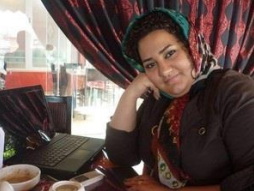
Iranian human rights defender and anti-death penalty campaigner Atena Daemi was violently
arrested on 26 November 2016 and taken to Evin Prison to begin serving a seven-year prison
sentence for peacefully defending human rights, including through: writing posts on Facebook
criticizing the authorities’ execution record; painting anti-death penalty slogans on walls;
distributing anti-death penalty leaflets; participating in a peaceful protest against the 2014
execution of a young Iranian woman named Reyhaneh Jabbari; visiting the gravesite of those
killed during the protests following the 2009 presidential election; and sending information about
abuses against political prisoners to human rights groups based outside Iran.
In the court verdict issued against her in April 2015, these peaceful activities were cited by
Branch 28 of the Revolutionary Court in Tehran as evidence of “gathering and colluding to
commit crimes against national security,” “spreading propaganda against the system” and
“insulting the Supreme Leader.” She is a prisoner of conscience.
Atena Daemi was first arrested in October 2014. She was held in Section 2A of Evin Prison –
which is run by the Revolutionary Guards – for 86 days, including 51 days in solitary
confinement. During this period, she was denied access to a lawyer even though she was
repeatedly interrogated. Branch 28 of the Revolutionary Court in Tehran sentenced her to 14
years in prison after a grossly unfair trial in March 2015 that lasted no more than 15 minutes. In
September 2016, Branch 36 of the Court of Appeal reduced the sentence to seven years. On the
way to prison following her November 2016 arrest, Revolutionary Guard officials blindfolded her
and repeatedly threatened her, saying that they would open new cases against her and had
“cooked up a plan so that she gets the thought of ever getting released from prison out of her
mind.”
Nowruz greetings for Atena Daemi can be sent to:
Iran Team, Middle East and North Africa Programme
Amnesty International
International Secretariat
1 Easton Street
London WC1X 0DW
United Kingdom
Leave a Reply